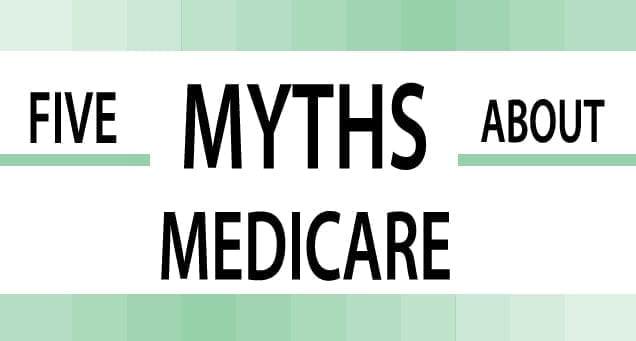Top 5 Medicare Myths

Educate yourself on these common Medicare myths — both your health and your wallet will thank you.
Medicare is a great program. I know because I meet with people every day who are turning 65 and entering the Medicare system and looking for help and advice on where to start and what to look for. Medicare saves you from having to pay enormously high private health-insurance premiums, and it protects you from catastrophic medical expenses. But if you’ve heard one of these common misunderstandings about Medicare, you will be glad you found this website.
1. Medicare enrollment happens automatically at 65
Everyone becomes eligible for Medicare at age 65, but actually enrolling in the program is up to you. The only way you’ll be automatically enrolled in Medicare is if you’re already receiving Social Security benefits when you hit your 65th birthday or if you are collecting Social Security Disability payments. In either of these cases, you’ll be enrolled in Medicare Part A (hospital insurance) and Part B (medical insurance) as soon as you become eligible, although it’s still up to you to sign up for any prescription drug coverage, Medigap, or a Medicare Advantage plan. — That’s where I come in! ![]()
Read more about How and When to Enroll.
2. You can enroll any time after age 65
This is not quite accurate. Your initial enrollment period for Medicare begins three months prior to your 65th birthday and ends three months after the month which you turned 65. If you don’t enroll during this seven-month period, you’ll have to wait for the next Medicare open enrollment period which happens between January 1 and March 31 and your Medicare benefit will begin on July 1st. And if you are enrolling in a Medicare plan it must be done prior to July 1st!
There are also penalties for late enrollment. If you don’t sign up for Part A during your initial enrollment window, then your monthly premium will go up by 10% for twice the number of years you could have been enrolled but were not. For example, if you file for Medicare Part A three years after you become eligible, then you’ll have to pay a higher premium for six years.
You should also sign up for Part B as soon as you’re eligible. If you don’t, your premium will go up 10% for every year you delayed — permanently.
Read more about How to Correctly Plan Your Enrollment.
3. Medicare is free
This is a big one! Especially with all the advertisements out there saying that plans have no cost or $0 monthly premiums.
Some parts of Medicare and some covered services are indeed free, but there are certainly some costs involved. Medicare Part A, which covers in-patient hospital stays, has no monthly premium if you worked (and paid Medicare taxes) for at least 40 calendar quarters (or 10 years) by the time you enroll. Medicare Part B, which covers outpatient doctor visits, routine bloodwork and similar expenses, has a premium of $134 per month in 2017, although high-income enrollees may pay higher premiums.
Other Medicare parts and plans have a wider range of premiums, often based on the type of plan and where you go for care. As for services, different Medicare parts and plans offer different levels of coverage for various medical expenses. Some expenses may be completely covered by Medicare, such as an annual wellness exam, while others require you to pay a co-pay or meet an annual deductible.
Read more about How can insurance can have a $0 premium?
4. Medicare covers all types of healthcare expenses
The different parts of Medicare cover different types of healthcare. Medicare Part A covers only hospital-related services, while Part B covers other types of medical expenses such as doctors’ visits and lab tests. Part D covers prescription expenses.
Part C, also known as Medicare Advantage, can cover additional services such as vision and dental care. Medigap plans help cover some of the costs that Medicare Part A and Part B don’t cover, but it doesn’t include prescription coverage, dental, vision, and so on. So the exact coverage you have will depend on which parts of Medicare and which specific plans you sign up for.
5. You may not qualify for Medicare
Happily, you cannot be rejected from Medicare coverage just for being sick or having a pre-existing condition. For that matter, pre-existing conditions won’t raise your premiums, either. This should continue to be the case for Medicare even if Congress repeals the Affordable Care Act’s pre-existing condition clause.
Still have questions or want help comparing the different health insurance plans? I can help you!
Are you turning 65 and still working? Read this.
There is no obligation to you and no cost to meet with someone.


